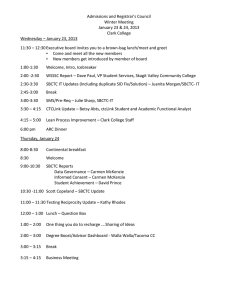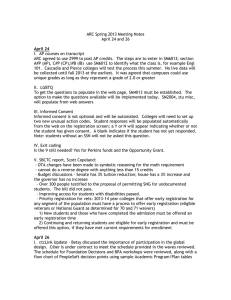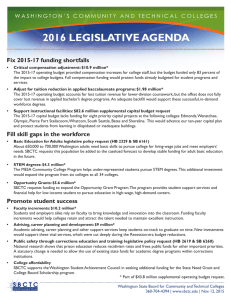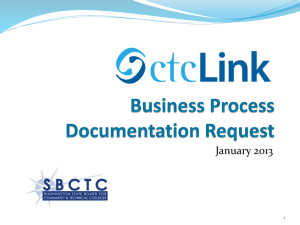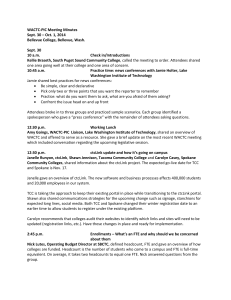Washington State Student Services Commission Fall 2014 Meeting Minutes
advertisement
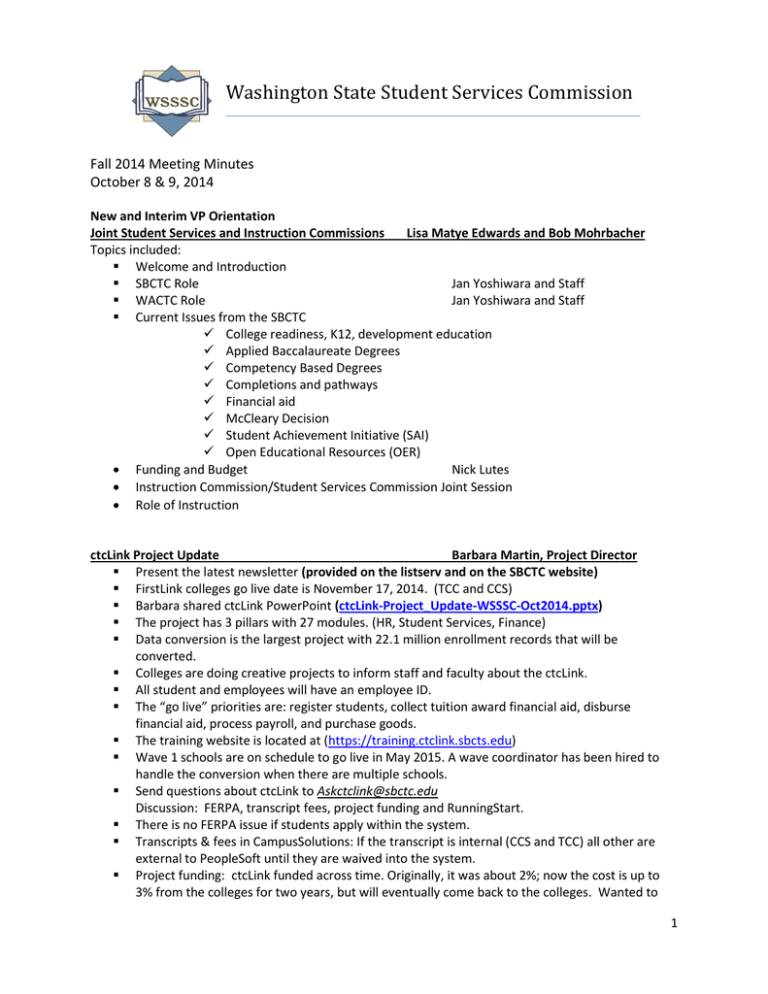
Washington State Student Services Commission Fall 2014 Meeting Minutes October 8 & 9, 2014 New and Interim VP Orientation Joint Student Services and Instruction Commissions Lisa Matye Edwards and Bob Mohrbacher Topics included: Welcome and Introduction SBCTC Role Jan Yoshiwara and Staff WACTC Role Jan Yoshiwara and Staff Current Issues from the SBCTC College readiness, K12, development education Applied Baccalaureate Degrees Competency Based Degrees Completions and pathways Financial aid McCleary Decision Student Achievement Initiative (SAI) Open Educational Resources (OER) Funding and Budget Nick Lutes Instruction Commission/Student Services Commission Joint Session Role of Instruction ctcLink Project Update Barbara Martin, Project Director Present the latest newsletter (provided on the listserv and on the SBCTC website) FirstLink colleges go live date is November 17, 2014. (TCC and CCS) Barbara shared ctcLink PowerPoint (ctcLink-Project_Update-WSSSC-Oct2014.pptx) The project has 3 pillars with 27 modules. (HR, Student Services, Finance) Data conversion is the largest project with 22.1 million enrollment records that will be converted. Colleges are doing creative projects to inform staff and faculty about the ctcLink. All student and employees will have an employee ID. The “go live” priorities are: register students, collect tuition award financial aid, disburse financial aid, process payroll, and purchase goods. The training website is located at (https://training.ctclink.sbcts.edu) Wave 1 schools are on schedule to go live in May 2015. A wave coordinator has been hired to handle the conversion when there are multiple schools. Send questions about ctcLink to Askctclink@sbctc.edu Discussion: FERPA, transcript fees, project funding and RunningStart. There is no FERPA issue if students apply within the system. Transcripts & fees in CampusSolutions: If the transcript is internal (CCS and TCC) all other are external to PeopleSoft until they are waived into the system. Project funding: ctcLink funded across time. Originally, it was about 2%; now the cost is up to 3% from the colleges for two years, but will eventually come back to the colleges. Wanted to 1 sell $100M in bonds, but only got approval for $50M. The $50M did not cover the cost of the project because they are doing a global solution. Most of the funds have already been spent on the FirstLink colleges. RunningStart Fee coding: are courses eligible to be waived? ctcLink is working on the process and rules and will try to make it easier. The request is to have it automated like it is in SMS. The plan is to put together a RunningStart workshop. Accommodations & accessibility for Councils/Commissions/Conferences Discussion: This came forward from the DSSC. Who should pay for accommodations at the councils, commission and conferences meetings? Who should be responsible for compliance in technology? Ask DSS to provide some guidelines, principles and practices. Should the president weigh in on this issues or should a referral be made to Ed. Services? Jan Y. suggested that WSSSC make a set of recommendations to WACTC. Offered staff to help develop recommendations. Because it is intermittent, another possibility would be to apply to WACTC for funds as needed. All of the councils and commissions should be consist in addressing the issue. Councils and Commission meetings are separate from the conference for students (i.e. DREAMers conference). Decision: Deb will forward questions to HR commission and Lisa will inform Ed Services about this issue. Deb will go back to DSS to get guidelines and options of how to handle this. SARA (Title IV Compliance) Joe Holiday/Jan Yoshiwara, SBCTC Discussion: State Authorization and Reciprocity Agreement: this is about false advertisement regarding the program integrity issue (placement rates, etc.) This does not have anything to do with student grade complaints. The recommendation from the AAG Marvin is the following three options: 1. Seek authority from the Legislature to promulgate and administer a financial aid grievance procedure on behalf of the community and technical colleges. 2. Enter into an agreement to have WSAC administer the existing grievance procedure. 3. Work with WSAC to revise the existing grievance procedures so that they address community and technical college concerns. The question was raised about whether there was a true cost to WSAC to offer this service? Motion: Rhonda Coats moved to recommend SBCTC seek statutory authority to investigate and resolve student complaints about program integrity (Title IV) --seconded by Ata Karim. Motion approved. WACTC report Dr. Pamela Transue Operating Budget Request includes funding for Basic Education, SAI, advising and career interventions, opportunity grants, closing the skills gap, salary increments, and facilities. We also discussed the ctcLink cash flow problem. Colleges will need to contribute about $6M per year for next two years. Based on projections, it should be okay after that. Mark Matsui called to inform WACTC about the new Workforce Investment and Opportunity Grant legislation. Mark is looking for Men of Distinction Programs and any other program we have in place to promote the success of young men of color. 2 We have new guideline from OFM for our infrastructure cost. WACTC voted to limit the colleges eligible to compete for projects in the 10 colleges who haven’t had a project funded since 2011-13 biennium. TACTC has voted to change their name to WA State Association of College Trustees (WSACT) 9:30 a.m. Tacoma ctcLink overview Andy Duckworth, TCC Project Director Supporting systems are applications on campus that enhance the legacy environment. Some of this may carry over after “go live.” Data conversion: where in the legacy environment you have been the most creative will be the most difficult to convert into PeopleSoft. (i.e. Transcripts) The assessment table are most flexible in SMS, but causes problem in PeopleSoft Placement systems do not work well in the new system Begin to think about backfill positions early for identified SMEs. Sandbox environment: Spend time in there early and often. It will help to begin to understand the business processes. Learn how to navigate the system and learn how the processes will begin to change as the transition happens. (Highly recommended) It is important to go to the training sites as well. Begin to think about how training will happen especially during school term when computer labs will be in full use by students. TCC are using additional laptops that will be used to do the training across the campus. SBCTC topics Jan Yoshiwara and Joe Holliday, SBCTC The operating budget is $182 million Basic skill: increase the funding per FTE Case load funding bases Basic Skills changed to Basic Education for Adults to match BE for children Basic skill may be pulled out of enrollment targets if we shift to the case load method. It will be similar to how we are funded for running start students. Operating Budget Keeping student on track Fund SAI at the 5% level ($57.6M) Advising, career counseling services ($18M) Opportunity Grant ($11M) Improve success in math and STEM ($10). This would increase the number of MESA programs in the system from 6 to 20. Capital Budget (($367 Million) There is only room for three construction request in the next biennium (15-17) WACTC Allocation Task Force Recommendations What’s happening now? Recommendations were approved at summer meeting. Implementation will happen in 2015-16 budget year for next biennium. 3 Smarter Balanced Assessment Agreement This is the agreement on the use of the Smarter Balanced 11th Grad career and college readiness assessment for placement in Washington community and technical college system. We agreed to use SB as one of the placement options of high school students. This is not a replacement but an addition to the current placement tests. Please contact Bill Moore (360.704.4346, bmoore@sbctc.edu) if you have any questions. Council of Presidents (COP) Sexual Assault Prevention & Response conference (October 30, 2014) We are well represented at the conference. Many WSSSC members are presenting and serving on panels. WSAC Dual Credit Bill Draft This will expand college in the high school. The bill is a disincentive for the Running Start program. The bill may essentially eliminate Running Start in the high school. The Running Start program is about 19,000 students. There will be pressure for CC to do college in the high schools This could impact a student’s financial aid down the road especially if students begin dual enrollment in the 9th and 10th grades similar to the impact to current Running Start students. We will know by December at the latest if the governor has included this into the budget. WSAC Recommendations on WSNG (must be made by 12/1) Close the funding gap to serve more students Establish the state policy goal and improve predictability Develop statewide messaging for students and families Explore the “shared responsibility” formula used by Minnesota and variations to evaluate the impact to students by income level and sector Evaluate methods to incent student progress Competency-Based Education /Degrees MOUs are currently to be signed and sent to CBC. The consortia still around 10 college--originally around 14. The plan is to enroll students in course in January. Faculty job announcement are going out shortly. Columbia Basin is taking up the slack in the cost for implementation because of the low number of colleges in the consortia. They have hired staff (Director and Student Services staff) to lead the project. Applied Baccalaureate Degrees We now have 39 degrees at 17 colleges. We are experiencing some push back from the universities. The concern is that we may take their state funding. The SBCTC is not interested in expanding authority beyond the Baccalaureate Degree. There might be a problem with students attempting to apply to graduate school program at the major university within WA with a BAS degrees from CC. SBCTC will put together a one-pager about the BAS degrees Reverse Transfer A kick-off meeting is happening on November 17, 2014. 4 Washington MESA Community College Program (MCCP) There are only 6 MESA program within the system now. MESA directors should be working with students instead of collecting data. The SBCTC will handle it. Achieving the Dream (AtD) Working Families Success Network Grant We have 4 AtD colleges in the system. Joe Holiday informed us that most of our non-discrimination statements are outdated. The start next quarter program An initiative to reach out to adults that are receiving aid. This is housed at the Seattle district. Looking for one VP to sit on the governing board. (Dennis Long volunteered) Updates on hot topics in WSSSC Student Code of Conduct There is a model student code of conduct that has been used to develop the code on the individual campuses. If you do not have the model, please reach out to one of your colleagues or you can contact Jack Huls at Peninsula College. Leaves for Faith & Conscience There needs to be a policy in place to allow students and staff has two days of leave for reasons of faith and/or conscience. There is a mix of which department will manage the policy. Some colleges will have VPSS, some will have VPI and other will have some other department like Human Resources. The new law as applied to employees has been codified in RCW 1.16.050(3). RCW 28B.10.039 provides two days of leave for students enrolled in institutions of higher education. VAWA Educational & Training Green River have developed an interim video; when editing is completed it will be shared out to others. They will be testing the video with 200 students during the winter term. Some colleges have purchased canned training and working on ways to get in out to all students working with the student leaders on campus. Some are part of the student orientation. Columbia Basin College is beginning a “Getting Started” program with Campus Clarity that will include a drug and alcohol components. The cost is approximately $7 per student. Colleges are addressing the issue of pregnancy and nursing clinical Dept. of Defense and student fees The latest is that tuition is covered by tuition assistance, but not fees unless it is attached to a course. TA covers operating fee but not the building or S&A fees that is included in tuition. Tuition and fees are defined in statue. 5 Attach information from Joanne Weisman What is the latest on Ebola? Some colleges have been contacted by the health department. There is great resource created by a librarian that will be sent out. This is still new territory and colleges are management it as it comes up. LGBTQI Question Where would this question go on the new system? How will this be handled by PeopleSoft? There is a student group function that can be used to capture this information. It may be shifted to application in PeopleSoft. Some colleges prefer to have it at application vs. registration. There is concern that if it is on the registration form that faculty will see. Should faculty know this information? Some colleges only have the question online so there is no paper trail with answers to this question. Some have both online and on paper application. The number of questions/concerns has been minimal. Colleges are beginning to use the data collected from this question to inform programs, policies and budgets. This issue will be placed on our list for continued discussion at our winter meeting. WSSSC Work Plan – tasks and leads (see attached). Lisa walked through each objective of the plan. Increase the potential pool of a skilled, well-educated workforce. Improve academic achievement of students. Increase enrollment and success of underserved student population (i.e. veterans, LGBTQI, returning adult, and college bound scholars). Support and provide inputs through the established governance process for ctcLink project Leverage transformational technology resources that positively impact student success (e.g. advising dashboard) and align with ctcLink planning and implementation. Present timely and relevant professional development sessions at commissions and council meetings. Review structure of WSSSC. (see below) Build a SEM (strategic enrollment management framework and understanding across commission and councils. (Training meeting on October 10 at Clover Park Technical College) Review structure of WSSSC Review the mission, need and purpose of each council, including bylaws, work plans and work products: Should council being looking at their charters WSSSC needs to do the work first because we have expectations of the councils. When do work groups become councils? The purpose is to standardize the work across the system. Should we be thinking about eliminating the Women’s Program Council because there are only 8 system-wide? (5 Instructional,3 student service) This does not mean the programs will be eliminated on campuses. Councils provide expertise and advocacy for a significant segment of student services. 6 There should be councils and interest groups. New councils need formal approval from WACTC. WACTC constitution speaks to councils and the Councils should: Represent administrative area that is central to the work of student services/college. Represented at all or most colleges. Work to standardized or improve practices across system. Share expertise and advocacy on significant functional area. Available to be assigned work from work plan. WSSSC bylaws states: Christine, Matt, Ata and Deb will look at the bylaws and perhaps bring back draft including changes. Analyze the relationship and role of NWAC to WSSSC and community college mission. How do we make sure that code proposals going forward that WSSSC does not support? We received a comprehensive list of NWAC commissioners. NWAC will get code proposal out earlier so they can be reviewed. Codes that have costs attached can be an issue. We will draft some guidelines that will include feedback/approval from Ed. Services Ed will be provided the guidelines before he is invited to the meeting. Please send changes/updates to the commissioners list to Lisa Mayte Edwards. WACTC Committee Reports Education Services Operational Budget Covered on SBCTC report Lisa Matye Edwards Marci Meyer Technology Bill Belden Most of the information from WACTC Technology were covered in the SBCTC report. The committee discussed two key issues: ctcLink and Core Technologies for our system. ctcLink Topics User acceptance testing (UAT) is underway. Colleges must be ready for the staff and resource commitment required to complete this process. The project has a $6 million funding gap, cash flow challenge that will need to be resolved in time for next budget cycle. GoLive risk assessment – work is being done to mitigate potential challenges with financial aid, payroll, etc. Training is critical and need to be thoughtful about how this will be accomplished for all staff. Very time intensive. Will SMS be shut down during the system conversion to PeopleSoft or will it be available as a resource? Current thinking is that we will have access to SMS, but no change access. 7 Core Technology. This committee must decide what role we play in determining core technology across the system. A request from library directors was discussed at our meeting and we know more requests will be coming in the future. No decisions were made at this meeting. Committees & Taskforces (reports attached or sent through the listserv) The Association Articulation & Transfer No report Capital Committee Ask for a Student Services rep to serve as a liaison. There is concern about infrastructure. No pre-design phase just design and build Ata Karim Erin Blakeney & Mathew Campbell Jack Huls Smarter Balanced Implementation (not met yet) ARC: Kathy Rhodes, N. Seattle; Janis Farmer, Whatcom ACC: Kristi Wellington-Baker Walla Walla; Steve Quinn, Olympic Data Governance Dave Paul Master Source Data There is a proposal to create master source data that is used for state and federal reporting. The Data Governance Committee would work to standardize the coding of this data to help ensure that the data collected is of high quality. Carmen will be presenting this concept to PRC and ARC. It was suggested that DGC propose which data would be standardized by DGC so that all relevant groups could provide input on the proposal. Data Governance Exploring a system-wide procedure for entering students into PeopleSoft who have a mono-name name (like Oprah). There seems to be consensus among DGC that this would be a good idea. A number of reasons to pursue this: The Name fields are included in the master data views. In PeopleSoft, the name fields are shared between students and employees, which requires a cross-functional discussion. SBCTC and OFM use the student’s name for matching to external systems such as university enrollment records. Update: at the Fall WSSSC meeting, WSSSC was supportive of pursing a standardized system-wide procedure for mono-names. eLearning No report Joint Access/JTC Disability & Technology Bob Morbacher Alison Stevens & Marci Myer Deb Casey 8 DSS minutes sent through listserv Math & Common Core Leslie Blackby & Ata Karim Agreed the SBCTC will outline a plan that will be shared broader on Math acceleration Business Meeting Historian Report Presented the Chief Student Services Officer list President’s Report Get from Lisa Dennis Long Lisa Matye Edwards Treasurer’s Report Budget report presented. Our account is now located at the SBCTC. Marci Myers WSSSC Voting Members only discussion Winter Meeting Spring Meeting Skagit Valley, February 5 & 6, 2015 Spokane Falls & CC, April 30 & May 1 Upcoming events October 10 Oct 14, 23, 24 & 31 October 27 October 28 October 30 October 29 & 30 November 5-7 SEM Drive In, Clover Park Regional DREAMer Training Days Achieving the Dream Meeting 2014 Best Practices Exchange, Clover Park Sexual Assault Prevention & Response Conference, UW ATIXA Title IX Investigator Training, Pierce College 19th Annual Faculty and Staff of Color Conference 9
